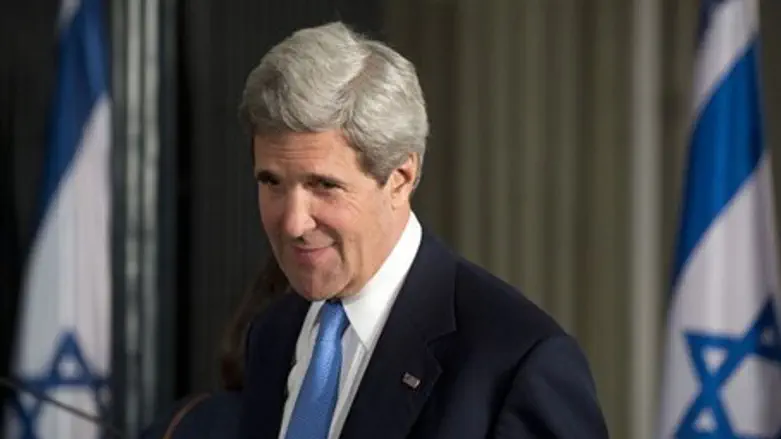
U.S. Secretary of State John Kerry said Wednesday that his intense diplomacy in six visits to the Middle East was bearing fruit and narrowing gaps between Israel and the Palestinian Authority, AFP reported.
Kerry met in Jordan with PA Chairman Mahmoud Abbas late Tuesday and again on Wednesday as he also outlined his ideas to kickstart direct negotiations to other top Arab officials and ministers.
The U.S. envoy, who has made the resumption of Middle East peace talks after a three-year break a priority since he took office on February 1, said the goal was getting nearer.
"Through hard and deliberate, patient work, and most importantly through quiet work, we have been able to narrow those gaps very significantly," Kerry told a press conference.
"We continue to get closer and I continue to be hopeful that the two sides will come to sit at the same table," he added, standing alongside his Jordanian counterpart Nasser Judeh.
Kerry acknowledged that differences remained between the two sides, despite his shuttle diplomacy which saw him hold hours of talks with both Abbas and Israeli Prime Minister Binyamin Netanyahu on his last visit last month.
"There are still some elements and some language that needs to be agreed upon and worked out. This is normal, and I'm not going to detail specifics," he said, according to AFP.
Abbas has insisted that Israel recognize the 1949 Armistice Line as a designated border for any future PA state. Israel refuses, as the pre-1967 borders are indefensible and withdrawing back to these borders would guarantee its destruction.
The demand that Israel recognize these indefensible borders as a designated border for a Palestinian state is just one in a long line of preconditions that Abbas has imposed on negotiations. He has also demanded that Israel release terrorists jailed before the 1993 Oslo Accords and that it freeze all Jewish construction in Judea, Samaria and eastern Jerusalem.
Netanyahu has called for talks without preconditions and instead is considering "good will gestures" such as the release of PA Arab prisoners or a partial freeze on Jewish building.
Arab League chief Nabil al-Arabi and Gulf Arab envoys who were also in the Jordanian capital on Wednesday gave strong backing to Kerry's peace push.
"The Arab delegates believe Kerry's ideas... constitute a good ground and suitable environment for restarting the negotiations," a statement quoted by AFP said.
The statement also noted "that the ideas proposed by the Secretary of State lay the proper foundation to start the negotiations especially on the political, economic and security areas."
A team of experts has been drawing up a plan to attract some $4 billion in private investment to shore up the struggling PA economy, which Kerry repeated could boost GDP by 50 percent over three years.
Kerry also highlighted efforts to address Israel's security concerns, pointing to the role of General John Allen, who has been dispatched to the region as an adviser to the Pentagon on Middle East security issues.
Kerry said Allen is "working with our team and with the Defense Department and with the Israeli forces” and soon be visiting the PA-assigned areas of Judea and Samaria “to make evaluations on a professional military basis about the nature of threats.”
He urged Israel to "look hard" at a decade-old Arab peace blueprint which he said "promises Israel peace with 22 Arab nations and 35 Muslim nations -- a total of 57 nations -- that are standing and waiting for the possibility of making peace with Israel."
The Arab Peace Initiative, unveiled in 2002 by Saudi Arabia, says that 22 Arab countries will normalize ties with Israel in return for an Israeli withdrawal from Judea and Samaria.
It was recently revived when Qatar’s Prime Minister indicated that he supported a peace agreement between Israel and the Palestinian Authority that would be defined by the June 4, 1967 borders, but at the same time backed U.S. President Barack Obama's proposals for a "comparable and mutual agreed minor swap of the land" between Israel and the PA, to reflect the realities of the burgeoning communities on the ground.
A PA official, who asked to remain anonymous, told AFP things were moving and Kerry was "determined" to announce a resumption of talks before he leaves the region at the end of the week.
There are no immediate plans for Kerry to visit Israel and meet Netanyahu.
